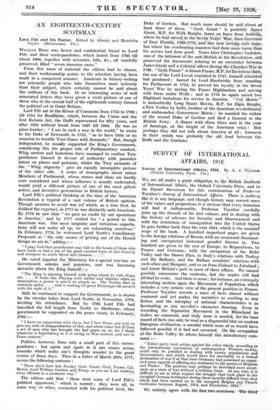AN EIGHTEENTH-CENTURY SCOTSMAN _
WILLIAM ROSE was factor and confidential friend to Lord Fife, and their correspondence, which lasted from 1763 till about 1800, together with accounts, bills, &c., all carefully
preserved, filled " seven immense cases."
From this mass of material the editors had to choose, and their workmanship points to the selection having been made in a competent manner. Amateurs in history-writing are primarily people -who take themselves more seriously than their subject, which certainly cannot be said about the authors of this book. In an interesting series of well annotated letters they have given a vivid picture of one of those who in the second half of the eighteenth century formed the political set in Great Britain.
Lord Fife sat in the House of Commons from 1754 to 1790 ;
till 1784 for Banffshire; which, between the Union and the first Reform Act, -the Duffg represented for fifty years, and
lifter 1832 without break from 1837 till 1898. He was no place-hunter ; " I am in such a way in the world," he wrote to the Duke of Newcastle in 1755, " as to have little or no occasion to trouble Your Grace with demands." But, though independent, he usually supported the King's Government, considering this the proper rule of Parliamentary conduct. Whig orators and historians have managed to confuse Tory gentlemen biassed in favour of authority with parasites intent on places and pensions, whilst the Tory accounts of the " Whig oligarchy " give an equally incomplete picture of the other side. A series of monographs about minor Members of Parliament, whose names and ideas are hardly ever considered and whose influence is usually underrated, would yield a different picture of one of the most gifted, active, and inventive generations in British history.
Lord Fife's political thinking at the time of the American Re;olution is typical of a vast volume of British opinion. Though anxious to avoid war (of which, as a true Scot, he disliked the expense), in 1775 he was distinctly anti-American.
By 1776 he saw that " we gain no credit by our operations in America," and by 1777 wished for " a period to this American war. Our most sanguine and victorious expecta- tions will not make all up, we are exhausting ourselves." In February, 1778, he welcomed Lord North's Conciliatory Proposals as " the only means of getting out of the Horrid Scrape we are in," adding :—
" I pray God that punishment may fall on the heads of those who have made so bad a use of the great exerted force of this Country and misspent so much blood and treasure . . ."
He voted (against the Ministers) fora special war-tax on Government salaries and pensions, and was becoming
sarcastic about the- King himself
" The King is amusing himself with going about to visit ships, etc. . . . It looks like Playing with rattles and whistles when so tremendous a power is arm'd to attack us. The Toulon fleet is certainly sailed . . . ours is waiting till great Personages be amus'd with the sight of it."
Still, he continued to support the Government, as is shown by the circular letter from Lord North, in November, 1779, inviting his attendance. But by 1788 Lord Fife had travelled the full length from North to Shelburne, whose government he supported on the peace treaty in February,
1788 :-
" I have no connection with them, but I love Peace and wish to give my vote of disapprobation of this, and abuse came but ill from a set of men who has brought the bad peace on us, for I think whatever is humiliating in it is owing to War-makers, and not to Peace-makers."
Politics, however, form only a small part of this corres- pondence ; but again and again in it one comes across remarks which make one's thoughts wander to the great events of those days. Thus in a letter of March 20th, 1777, occurs the following sentence :
" There din'd here last Sunday Genl. Grant, Gent Fraser, Col. Morris, Lord William Gordon, and Troup, so you see I am washing away offenses in a moderate way."
The editors add that " these were some of Lord Fife's political opponents," which is correct ; they were all, in some, way or other, connected with his political rival, the
Duke of Gordon. But much more should be said about at least three of them. " Genl. Grant " is probably James Grant, M.P. for Wick Burghs, home on leave from Aniircia, where hi-had served in the--Sevelareiirs' War, beetu!.governiir of East Florida, 1763-1773; ancev;as now serving once Mose, but where his overbearing manners had done more harm than his service had done good. Years later Christopher Gadsden, one of the bitterest of the anti-British in the Revolution, still preserved the documents -relating to an encounter betvleen James Grant and a ColOnial officer Duffs and the Gordon: –










































 Previous page
Previous page